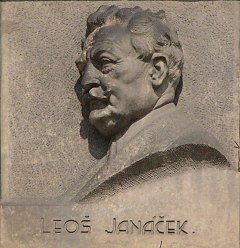Šárka (Janáček)
| Šárka | |
|---|---|
| Opera by Leoš Janáček | |

Relief of the composer by Julius Pelikán
|
|
| Librettist | Julius Zeyer |
| Language | Czech |
| Based on | Bohemian legends of Šárka |
| Premiere | 11 November 1925 Divadlo na Hradbách, Brno |
Šárka is an opera in three acts by Leoš Janáček to a Czech libretto by Julius Zeyer, based on Bohemian legends of Šárka in Dalimil's Chronicle. Written in 1887, the opera lay unproduced for many years and was first performed at the Divadlo na Hradbách (today's Mahen Theatre) in Brno on 11 November 1925 in honour of Janáček’s 71st birthday.
The premiere of the Ur-version (1887) of Šárka took place on 26 November 2010 at the Reduta Studio Theatre Brno as part of the Janáček Biennale, conducted from the piano by Ondrej Olos, with Lucie Kašparová in the title role. This first version (of which 30% of the music is retained in the score generally performed today) was sent to Dvořák for comment, but rested in the Janáček archive until 2010; the final version, with fewer motives and longer set-pieces, presages his mature works.
The composer had never completed the work, but, after the success of his later operas, Šárka was revised and the orchestration completed by his pupil Osvald Chlubna who had been given the task in preparation for the opera's eventual publication.
In 2000, Jiří Zahrádka edited a new edition of the score. A recording was made later that year based on this edition, with Sir Charles Mackerras conducting the Czech Philharmonic Orchestra and with Eva Urbanová in the title role; it was issued the following year (Supraphon SU 3485-2-631).
The premiere stage setting designed the architect and painter Vlastislav Hofman.
Before the opera begins, during Libuše's reign, women experienced a golden age and the female population had become the privileged members of society, but after her death this was not the case, causing a revolt that produced a female army, of whom Šárka was the fiercest warrior.
...
Wikipedia
